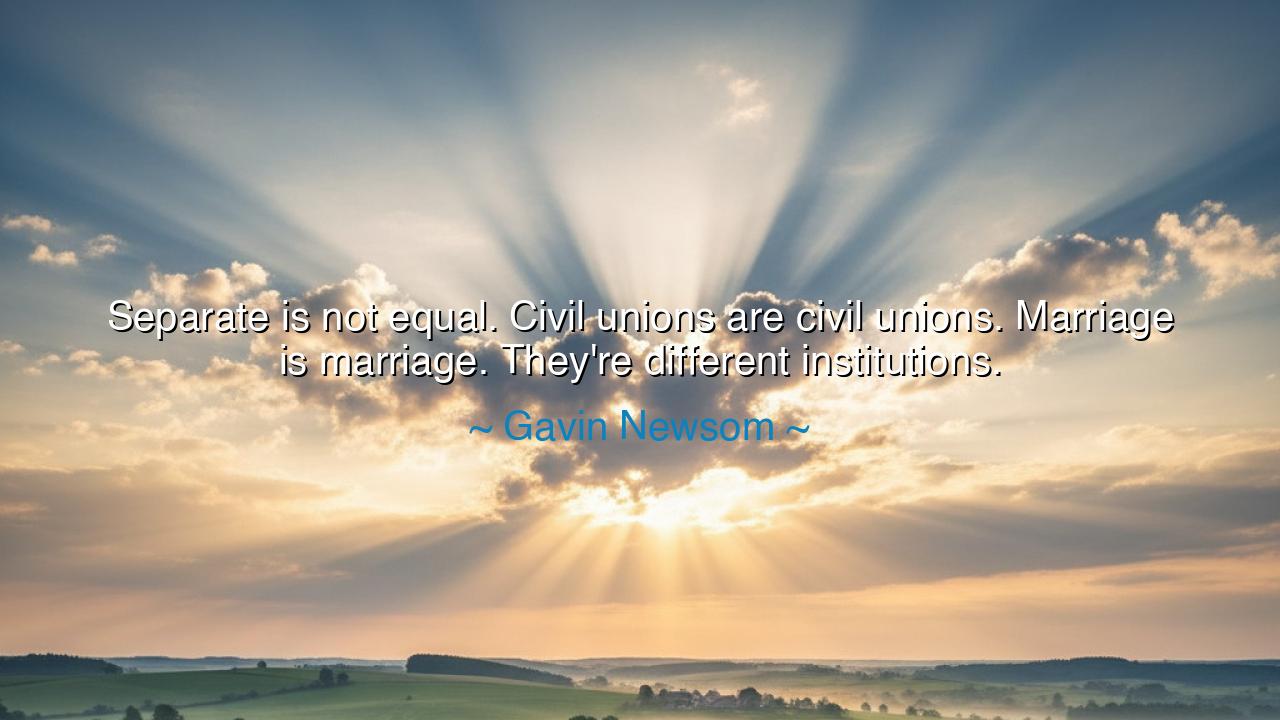
Separate is not equal. Civil unions are civil unions. Marriage is
Separate is not equal. Civil unions are civil unions. Marriage is marriage. They're different institutions.






In the firm and visionary voice of Gavin Newsom, spoken during a time of fierce division and awakening, we hear a declaration both moral and eternal: “Separate is not equal. Civil unions are civil unions. Marriage is marriage. They're different institutions.” These words carry the weight of centuries, for they echo an ancient truth—that justice divided is justice denied, that dignity cannot be granted in portions. In this quote, Newsom stands as one in a long line of those who defied the comfort of convention to speak for what is right rather than what is popular. His words are not merely political—they are philosophical, spiritual, and deeply human. They remind us that equality, if it is not whole, is not equality at all.
The meaning of this quote lies in the very heart of the human longing for recognition. Newsom draws a line between tolerance and true equality, between permission and belonging. A “civil union,” though granting certain legal rights, was not the same as “marriage.” It was a compromise—a structure that allowed same-sex couples partial acknowledgment, yet still marked them as separate, as “other.” By declaring “separate is not equal,” Newsom invokes a moral law that transcends any statute or constitution: that human worth must not be divided by categories or qualified by social comfort. To call one union sacred and another merely civil is to proclaim that love itself can be stratified. But love, like truth, does not bow to division.
The origin of these words rises from a long and painful history of separation masked as fairness. The phrase “separate is not equal” recalls the cry of the Civil Rights Movement, when Black Americans stood against the cruel illusion of segregation. In 1954, the United States Supreme Court, in Brown v. Board of Education, declared that “separate educational facilities are inherently unequal.” That truth, hard-earned through suffering, now found new meaning in Newsom’s voice as he stood for the equality of marriage. He understood that every generation faces its own form of segregation—sometimes by color, sometimes by gender, sometimes by love. His statement thus became an echo of the eternal struggle to reconcile law with conscience.
Consider the story of Loving v. Virginia in 1967, when an interracial couple, Richard and Mildred Loving, were arrested for the crime of their marriage. The state called their union unnatural, even illegal, and exiled them from their home. Yet they persisted, not in hatred, but in quiet courage. Their case rose to the Supreme Court, and with it came a decision that shattered the walls of racial separation in marriage. The Court ruled that the freedom to marry is a basic civil right of all people. Decades later, Newsom’s quote draws upon the same moral current: that love, no matter its form, must not be bound by human prejudice. Marriage is not a privilege—it is a declaration of equal humanity.
But Newsom’s words also carry a deeper resonance beyond politics—they touch the spiritual realm of human unity. When he says that civil unions and marriage are “different institutions,” he exposes how societies often offer the illusion of inclusion while maintaining the architecture of exclusion. Equality is not achieved through imitation—it is achieved through integration. The difference between being tolerated and being accepted is the difference between shadow and light. And so, Newsom’s declaration becomes not merely a legal argument, but a moral awakening, a reminder that equality must be felt as well as written, lived as well as proclaimed.
The wisdom within his statement also warns of complacency. Many will settle for partial progress, for comfort disguised as justice. But the ancients taught that to accept half a truth is to live half a life. As long as one group is told, “You may come this far, but no farther,” society remains wounded. True equality cannot exist while any part of humanity remains unseen or undervalued. Newsom’s courage was to speak aloud what many felt in silence: that equality, divided by semantics, is equality denied. To call something ‘almost equal’ is to confess that it is still unequal.
Therefore, O listener and seeker of justice, take this lesson to heart: never confuse tolerance with equality, nor imitation with inclusion. When you see walls built between people—whether of law, tradition, or fear—do not walk around them. Tear them down. Defend the full dignity of others as fiercely as you would defend your own. For when one love is diminished, all love is dishonored; when one person is separated, the whole of humanity is lessened.
And so remember the wisdom of Gavin Newsom’s words: that separate is never equal, and that love, to be just, must be free. When all unions are honored alike, when no one’s devotion is deemed lesser, then and only then will a society truly flourish. Let equality not be a gift bestowed, but a truth recognized—a light that shines not on some, but upon all. For only then does the world fulfill its oldest promise: that in the eyes of love, we are one.






AAdministratorAdministrator
Welcome, honored guests. Please leave a comment, we will respond soon